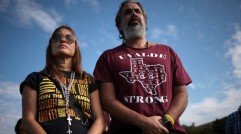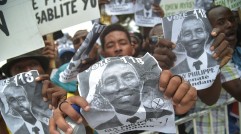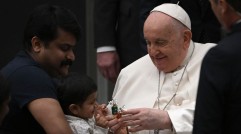Historic Tampa Bay Rays-Cuba Baseball Game Brings Countries Closer Together, Political Differences Remain
U.S. President Barack Obama and Cuba President Raul Castro spent Monday morning talking politics in an environment known for its tight-lipped free speech policies.
By Tuesday afternoon the world leaders were sitting side-by-side in Havana's Estadio Latinoamericano, basking in an American pastime older than the 55-year embargo they're working on breaking. Obama and the Tampa Bay Rays made history by participating in the first U.S.-Cuba baseball game since 1999.
"There is something about baseball that is so fundamentally woven into our culture," Obama said in an interview with ESPN. "At a time in our lives where everything is a mile a minute, there is nothing like going to a ballpark and everything slowing down a bit."
Among Major League Baseball diplomats making the trip were Commissioner Rob Manfred, chief baseball officer Joe Torre, players union executive director Tony Clark and beloved retired New York Yankees shortstop Derek Jeter.
On the field, the Rays were led by a majority of their projected everyday starters, including first baseman James Loney and three-time All-Star Evan Longoria.
Loney delivered the game's few fireworks, going 2-for-2 with three RBI and a two-run homer that put the Rays up early, 3-0. It was all the run support Tampa Bay pitching would need as they cruised to a 4-1 victory in front of an energetic crown used to seeing star players leave their island country, not come into it.
Overshadowed by Brussels
Fans waived the Cuban flag throughout. Many cheered when beloved right-hander Luis Tiant threw the first pitch. All participated in a moment of silence beforehand, in homage to the victims of Tuesday morning's ISIS-inspired terrorist attacks in Belgium that left at least 30 people dead.
Obama stayed halfway through, with Brussels in mind.
"The whole premise of terrorism is to try to disrupt people's ordinary lives," he said, adding that "it's always a challenge when you have a terrorist attack anywhere in the world."
The president compared it to the Boston Marathon bombing two years ago, and how one of his proudest moments came when baseball helped in the healing process.
"When [David] Ortiz went out and said probably the only time that America didn't have a problem with somebody, a person on live TV, was when he talked about Boston, how strong it was and that it was not going to be intimidated," Obama said.
Baseball Bringing U.S. and Cuba Closer
The last time a Major League team travelled to Cuba was 17 years ago, when diplomatic relations weren't as chummy.
Regime namesake Fidel Castro was still running the country and chose to sit between then-MLB Commissioner Bud Selig and Baltimore Orioles owner Peter Angelos during the March 28 exhibition game. As former Orioles infielder Mike Bordick put it, a frigid political climate carried into the batter's box.
"There wasn't any buddy-buddy stuff," Bordick told the Tampa Bay Times. "It wasn't like a Rocky fight or anything like that, but it was really competitive."
The U.S. and Cuba remain competitive, albeit with softened stances. Residents in each country can freely communicate. There is an ease in travel restrictions, and round-trip flights to and from Cuba are expected to begin by year's end. Last July, the U.S. embassy in Cuba reopened for the first time in half a century.
But glaring difficulties remain. Raul Castro is pushing for an end to Guantanamo Bay; Obama needs Congress to lift the embargo to do so. An awkward press conference Monday afternoon showed that Castro isn't ready to answer unfiltered questions about Cuba's human rights record.
The latter is one of the reason's prominent Cuba-born baseball players risk life, limb, and retaliation for a chance to play in the Majors, often making insidious deals with smugglers that have them taking a cut of contracts that haven't been negotiated yet.
Cuban Players Defecting
Last summer, Los Angeles Magazine detailed the extraordinary journey Yasiel Puig took in defecting. The future Los Angeles Dodgers outfielder promised smugglers a 20 percent cut of future earnings just for a chance at reaching the U.S. Puig fled through various Latin American cities, enduring sleepless nights in shoddy motels and bouts of violence, including the execution-style death of a smugglers that helped him arrive.
While this may not be the case for all Cuban national defecting to the U.S., the lack of star-caliber players in the exhibition game with Tampa Bay drove the point home: player's aren't just leaving for a bigger payday, they're risking their lives for freedom.
Puig did it, as did All-Star sluggers Jose Abreu and Yoenis Cespedes. Touted brothers Lourdes and Yulieski Gourriel defected in February by sneaking out of a Dominican Republic hotel after competing in the Caribbean Series. They join a lengthy list of defectors, dating back to 1959, that have left an indelible mark on the sport.
Rays minor leaguer Dayron Varona led off Tuesday, three years after defecting from Cuba with his mother. It was a fitting role for the Latin island native, who was all smiles as he popped out the first pitch. Varona had already won by becoming the first Major Leaguer to leave and return to play in Cuba, all while doing so in front of friends,family, and some 50,000 of his old neighbors.
Obama's trip marks the first time a sitting U.S. president has visited Cuba since Calvin Coolidge in 1928. If diplomacy talks progress, and the Castro regime can pardon players like Varona, Obama's successor may watch a similar game against Cuba. Possibly with Cuban nationals suiting up for a Major League team.
"One of the things we share is our national pastimes -- la pelota," Obama said in a speech. "Whether it's the middle of an Iowa cornfield or the neighborhoods of Havana, our landscapes are dotted with baseball diamonds."
He added, "While I will not ignore the important differences between our governments, I came to Cuba to extend the hand of friendship to the Cuban people."
Subscribe to Latin Post!
Sign up for our free newsletter for the Latest coverage!
* This is a contributed article and this content does not necessarily represent the views of latinpost.com













